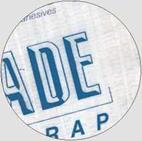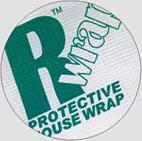Siding Often Determines the Type of Housewrap
When you’re using vinyl siding, which comes with built-in drainage holes and fits on the wall loosely, an ordinary smoothfaced housewrap provides good drainage. But with tightly fastened board siding, any water trapped between the siding and a smooth housewrap will sit and eventually could make its way through the housewrap and into the framing. Remember, although many housewraps are good at resisting bulk water, they should not be considered waterproof.
In these cases, it’s a good idea to choose a furrowed rain-screen housewrap. Its embossed texture provides just enough airspace for liquid water to drain away before it has a chance to penetrate the membrane (see "Rain screen and housewrap combined," p. 76).
When applying stucco, choose a house – wrap designed specifically for stucco and masonry, such as DuPont’s StuccoWrap or Benjamin Obdyke’s Mortairvent®, which not only provide a corrugated surface but also are compatible with the chemicals in stucco.
![]() Housewrap Choices
Housewrap Choices

 |
 |
(Dow)
Type: Nonwoven polyolefin Perm rating: 6.7 Notes: Membrane has a more substantial, foamlike texture compared to other housewraps. 866-583-2583; www. dow. com/styrofoam
Weathermate (Dow) Type: Perforated, woven polyolefin Perm rating: >5.0 Notes: Translucent; perforated products are less resistant to water intrusion; does not meet the air-barrier requirement of the National Building Code of Canada. 866-583-2583; www. dow. com/styrofoam
Barricade®
(Berry Plastics Corporation)
Type: Perforated, woven polyolefin Perm rating: 9.0 Notes: Translucent; perforated products are less resistant to water intrusion; resists UV- degradation for 12 months. 877-832-0333; www. berryplastics. com

Based on my lab testing at the University of Massachusetts, if I were buying housewrap today, I likely would choose a nonperforated product because it displays the best water resistance.
As it happens, I have felt paper on my own home. If I could do it over again and choose between felt and housewrap, I’d still choose felt. That’s because I believe that under certain circumstances, felt paper outperforms housewrap.
For example, an ice dam or a roof leak might allow liquid water to get behind the
felt or housewrap. It’s also possible for the sun’s heat to drive water vapor through the housewrap from the outside, where it can condense on the sheathing. In either case, you have liquid water on the wrong side of the wrap. Under these conditions, the liquid water is trapped by the housewrap, which is permeable only to diffusion of water vapor. Felt, on the other hand, absorbs water and dries more quickly to the outside.
Paul Fisette is director of building materials and wood technology at the University of Massachusetts.




R-Wrap (Berry Plastics Corporation)
Type: Nonwoven polyolefin Perm rating: 56.0 Notes: Membrane can be installed with printed logo in or out without change in performance; manufacturer will replace product if damaged by wind. 877-832-0333; www. berryplastics. com
GreenGuard® Value (Pactiv® Corporation) Type: Perforated, woven polyolefin Perm rating: 15.0 Notes: Low-cost house – wrap for the valueconscious builder. Resists UV-degradation for 12 months; translucent membrane makes it easy to see where to nail siding. 800-241-4402; www. green-guard. com
GreenGuard Classic (Pactiv Corporation) Type: Perforated, woven polyolefin Perm rating: 15.0 Notes: Resists UV – degradation for 12 months. Highly tear – resistant; translucent, glare-reducing green color. 800-241-4402; www. green-guard. com
GreenGuard Ultra (Pactiv Corporation) Type: Nonwoven polyolefin Perm rating: 48.0 Notes: Uses a reinforcing scrim that makes it highly tear-resistant. Translucent membrane makes it easy to see where to nail siding. 800-241-4402; www. green-guard. com






Leave a reply